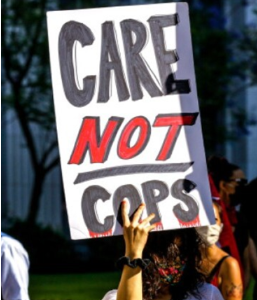Crossover – the day by which all bills in one house of the Maryland General Assembly must pass over to the other in order to be passed by both houses by the end of the session – has happened. Here’s an update on status of the bills we’ve been following.
Two bills that SSJC supported did not pass either house of the General Assembly, which means they will not move forward this year. These are the bill that would have clarified that local Police Accountability Boards can have independent investigative powers, and the bill to prohibit no-knock warrants. On the other hand, two bills that SSJC opposed will not move forward either. These include the bill to repeal last year’s ban on searches based on the odor of cannabis, and a bill that would have allowed the police to interrupt the disciplinary process for police misconduct by going to court for relief.
While bills that would have repealed an important law that requires police to provide children with an attorney prior to a custodial interrogation did not move forward, a bill containing extremely regressive and harmful changes to Maryland’s juvenile justice system has passed both chambers and is in the reconciliation process; it is expected to pass and be signed by the governor. Three of our key partners, Racial Justice NOW!, Jews United for Justice, and the ACLU of Maryland have been working hard to fight this bill. You can read more about their efforts here.
A bill that SSJC’s Mental Health Committee recently became engaged in opposing passed out of the House in time for crossover to the Senate. HB 1019 expressly states that law enforcement officers may use force – as permitted by the state’s use of force law – to execute emergency petitions. Emergency petitions are used to involuntarily take a person to a hospital or mental health facility for a mental health evaluation when the person is thought to be a danger to themselves or someone else. Law enforcement officers can execute emergency petitions without a judge’s or anyone’s permission.
According to MCPD’s data, one-quarter of all uses of force by police officers in 2022 were during the service of an emergency petition. Consistent with SSJC’s opposition to the use of police force generally and to police involvement in mental health crisis response, SSJC believes that there are far better ways to handle emergency petitions than by police involvement, and by the use of physical force. SSJC also opposes the bill because it extends the life of an emergency petition from 5 days to up to 30 days to provide additional time for officers to apprehend the person to be taken for a mental health evaluation. Because a person’s mental state is changeable, as time passes, it is quite possible that an emergency petition may not be needed. SSJC collaborated with Disability Rights Maryland, the Maryland Office of the Public Defender, and the ACLU of Maryland, in developing our opposition to the bill. You can read our testimony here. We will keep you updated on action opportunities as we fight against the bill in the Senate.
